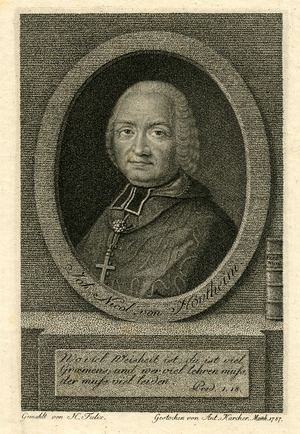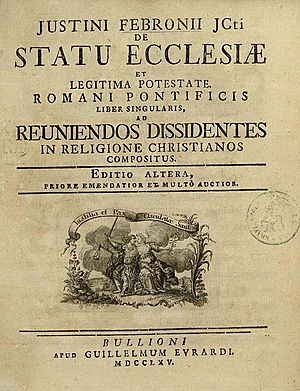Johann Nikolaus von Hontheim facts for kids
Johann Nikolaus von Hontheim (born January 27, 1701 – died September 2, 1790) was an important German historian and religious thinker. He is best known by his pen name, Febronius. Under this name, he wrote a famous book in 1763 called On the State of the Church and the Legitimate Power of the Roman Pontiff. This book led to a new way of thinking called febronianism, which questioned some of the Pope's powers.
Contents
Early Life and Education (1701-1728)
Johann Nikolaus von Hontheim was born in Trier, a city in Germany. His family was well-known and had worked for the government of the Electors of Trier for many years. His father, Kaspar von Hontheim, managed the finances for the Electorate.
When Johann was just twelve, his uncle helped him get a special position in a church. He then started his education with the Jesuits in Trier. He also studied at universities in Trier, Leuven, and Leiden. In 1724, he earned his degree in law from Trier. During his studies, he was greatly influenced by the ideas of a professor named Zeger Bernhard van Espen. These ideas, known as Gallicanism, suggested that national churches should have more independence from the Pope.
After finishing his studies, Hontheim traveled around Europe. He spent some time in Rome. In 1728, he became a priest.
Career and Important Work (1732-1778)
In 1732, Johann Nikolaus von Hontheim officially joined the church chapter of St Simeon in Trier. He also became a professor of law at the University of Trier.
In 1738, he was sent to Coblenz to work for the Elector. In this role, he saw how the Roman Curia (the Pope's administration) influenced the internal affairs of the Holy Roman Empire. He was involved in the elections of emperors Charles VII and Francis I. During these events, the Pope's representative, called a nuncio, made certain demands. This made Hontheim start to question the basis of the Pope's involvement in such matters. His thoughts on this topic later became the famous book he published as Febronius.
In 1747, Hontheim became very tired from his work and decided to step down from his official position. He returned to St Simeon, where he was chosen as the dean (a leader) in 1748. The archbishop-elector, Francis George von Schönborn, then appointed him as an auxiliary bishop in 1748. This meant Hontheim was a helper bishop, taking care of the spiritual duties of the diocese. He did this important work, along with being a pro-chancellor of the university, until 1778.
Later Life and Legacy (1779-1790)
In 1779, Johann Nikolaus von Hontheim resigned from his deanery position because of his old age. He was known as an energetic, hard-working, and generous person.
He passed away on September 2, 1790, at Château de Montquintin. He was first buried in St Simeon's church. However, the church was destroyed during the French revolutionary wars. In 1803, Hontheim's body was moved to the church of St Gervasius.
Historian and Febronius
As a historian, Hontheim is known for his detailed work on the history of Trier. While working in Coblenz, he gathered many printed and handwritten materials. He used these to write three books about Trier's history. Two of these, Historia Trevirensis diplomatica et pragmatica (1750) and Prodromus historiae Trevirensis (1757), were published. They included a history of Trier and many important documents. His third work remains as a manuscript in the Trier city library. These books showed Hontheim as a pioneer in modern historical research.
However, Hontheim is most famous for his work as Febronius. His 1763 book, "On the State of the Church and the Legitimate Power of the Roman Pontiff," was the most important argument against the Pope having absolute power in Germany. The author of the book was soon known in Rome. But it wasn't until 1778 that he was asked to take back his statements.
Hontheim was threatened with excommunication (being cut off from the Church). Also, his relatives faced losing their jobs. After much thought, Hontheim signed a statement taking back his views, which Rome accepted. He was then no longer censored in 1781. He also published a book in Frankfurt, claiming his retraction was made freely. However, his letters show that he didn't truly change his mind on the main issues.
See also
 In Spanish: Johann Nikolaus von Hontheim para niños
In Spanish: Johann Nikolaus von Hontheim para niños
 | Precious Adams |
 | Lauren Anderson |
 | Janet Collins |



